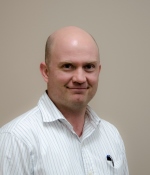 Who’s who in Science …
Who’s who in Science …
Dr. Ben Vanderlei joined UFV’s Mathematics and Statistics Department in August 2011. He teaches first-year and upper-level courses in both math and statistics.
Interview:
Personal
I grew up on a farm in rural South Dakota. My parents continue to own and operate the farm today, producing mostly corn and soybeans. Aside from the surrounding mountains and cities, the farms around the Fraser Valley remind me a bit of South Dakota. I typically get back for a visit once a year.
I attended college at South Dakota School of Mines & Technology in Rapid City, South Dakota. It is located within a 30 minute drive of both Mount Rushmore and Deadwood, which are probably South Dakota’s two biggest claims to fame. After earning a BSc in Applied Mathematics I was accepted to the graduate program in Mathematics at Tulane University located in New Orleans. I completed my PhD at Tulane in 2008.
Outside of UFV I find myself taking up various activities. I tend to rotate my hobbies on a regular basis. I do one thing intensely for a period and then move on to something else. Whenever the time is right, I get back to an old hobby or find something new. In the past few years I have spent time hiking/climbing, camping, tinkering with computers, brewing beer, and most recently playing board games.
I am a bit of a book collector but I don’t really like to name favorites. I like to read on a regular basis, and I can name some books that I have enjoyed. Here and there I will read a novel, but primarily I read non-fiction. I have enjoyed reading some of Bill Bryson’s work such as A Lost Continent and A Short History of Nearly Everything. I enjoy is mixture of humor and obscure historical trivia. I found Jared Diamond’s books (e.g. Guns, Germs, and Steel and Collapse) quite thought-provoking. Most recently I finished the Liberation Trilogy by Rick Atkinson, an engaging account of the liberation of Europe in WWII.
UFV Life
After my graduate work at Tulane, I worked for three years at UBC as a postdoctoral research fellow as part of a group modeling the motility of cells. When my term at UBC was through, I was not yet ready to leave the region. I focused my job search locally and this is how I discovered UFV. Fortunately, it was just at the time that the UFV was searching for a new faculty member in Mathematics.
I think I was most surprised to find here at UFV is the level of involvement that I have with my students. That sounds a bit strange, but prior to teaching at UFV I had never had the same person as a student for more than a single term. At UFV it is typical that I will teach the same student from first year Calculus through upper level courses. It is very rewarding to see students make such progress and develop their skills in mathematics and communication.
As far as people who have encouraged me here at UFV, I would like to say thank you to every member of the department. Over the past four years that I have been here, they have all made me feel welcome and have been generous is offering support to help me adjust to work and life at UFV.
Teaching
You asked if I had always known that I want to teach. The answer is “no”. As an undergraduate my career plans were ill-defined at best. I found most of my mathematics courses very interesting and I frequently picked up books at the local bookstore and studied topics independently. I took my classes with an aim to finish the degree, but with no real purpose for a career. It was during my senior year that I realized that I quite enjoyed the classroom and I began to think seriously about what it would take to be the teacher rather than the student. I was then fortunate enough to have the opportunity to act as a teaching assistant at that time. In doing so gained great respect for the knowledge and professionalism of my professors. They played a large part in inspiring me to pursue mathematics and teaching.
Most of my teaching at UFV is first-year Calculus, but I also teach upper-level Calculus, Differential Equations, Linear Algebra, Numerical Analysis and other courses depending on the needs of the department. If I had to name a favorite of mine, I would say it is Differential Equations. This topic is a very important application of Calculus, is rich in history, and has very practical modelling applications. In addition, I find that the students taking this course tend to be engaged and work hard to master the material we cover.
Do I have any advice to current or prospective students? Well, time at university is limited and it goes by very quickly. Try to get the most out of all of the courses and other activities in which you are involved. It is easy to focus much energy only on the courses that you find interesting, while neglecting others that are only filling a program requirement. Instead, treat each course or extracurricular activity as an opportunity for personal development as well as advancing your education.
ufv.ca/science
The opinions expressed in this article are the author’s own and do not necessarily reflect the views of the Faculty of Science.

